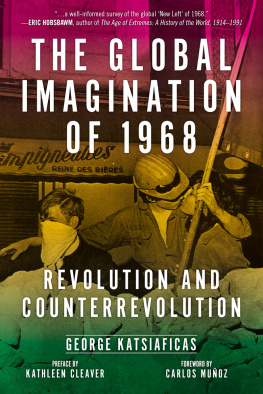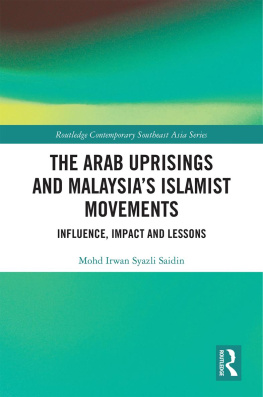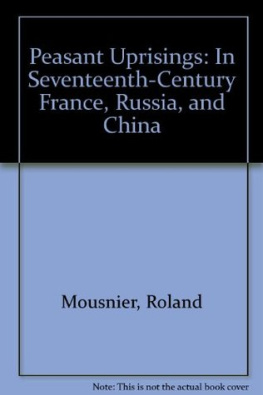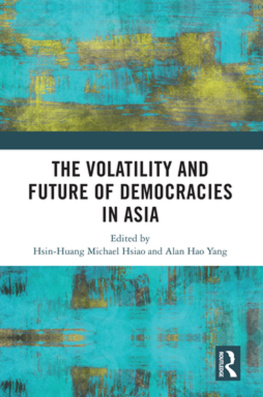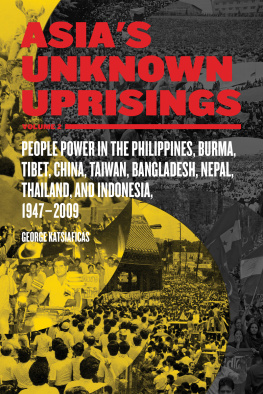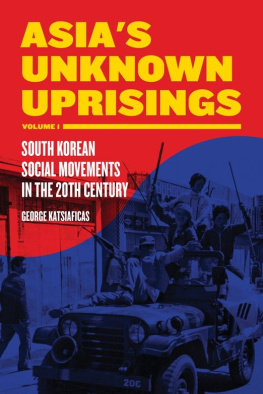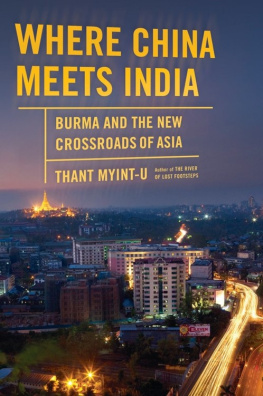This book about peoples power movements in Asia over the last sixty years makes the case, convincingly, that they should be seen as part of the worldwide new left. Reading it will broaden the perspective of activists and analysts in North America and Europe, a very important task.
Immanuel Wallerstein, Senior Research Scholar, Yale University
Visionary historian George Katsiaficas writes like a novelist with the eye for detail of a poet and the moral weight of a philosopher. He has circled the globe applying his seminal theory of the Eros Effect. Asias Unknown Uprisings is the latest chapter of his grand epic. Like Pablo Nerudas Canto General, Katsiaficass works are a blueprint for hope for all the peoples struggling for freedom.
Richard Cambridge, author of One Shot NewsPoetry of Conscience
In Asias Unknown Uprisings, George Katsiaficas inspires readers with an exciting yet scholarly examination of the rise and interlinking of mass revolutionary waves of struggle. In no way Pollyannaish, Katsiaficas presents readers with an analysis of the successes and failures of these late twentieth-century movements. In view of the phenomenal Arab democratic uprisings begun in late 2010 and early 2011, Katsiaficass analysis is profoundly relevant in helping us understand how the metaphorical flight of a butterfly in one part of the planet can contribute to a hurricane thousands of miles away.
Bill Fletcher, Jr., coauthor of Solidarity Divided, and editorial board member
George Katsiaficas is Americas leading practitioner of the method of participant-observation, acting with and observing the movements that he is studying. This study of People Power is a brilliant narrative of the present as history from below. It is a detailed account of the struggle for freedom and social justice, encompassing the different currents, both reformist and revolutionary, in a balanced study that combines objectivity and commitment. Above all, he presents the beauty of popular movements in the process of self-emancipation.
James Petras, author of The Arab Revolt and the Imperialist Counterattack
George Katsiaficas has written a majestic account of political uprisings and social movements in Asiaan important contribution to the literature on both Asian studies and social change that is highly recommended reading for anyone concerned with these fields of interest. The work is well-researched, clearly argued, and beautifully written, accessible to both academic and general readers.
Carl Boggs, author of The Crimes of Empire and Imperial Delusions, and professor of social sciences, National University, Los Angeles
With a characteristic discipline, which typifies the intellectual fabric of great minds, George Katsiaficas shares a family resemblance with Herbert Marcuse, the greatest revolutionary thinker of the twentieth century. Like Marcuse before him, Katsiaficas imbues us with eros for revolutions and respect for meaningful facts. As he surveys the Asian world from Burma to China, activists will be guided by his vision, historians will be informed by his mastery of world history, sociologists will find his fertile imaginations arresting, and ordinary readers will be enticed by the literary flow of this great work. This is a great read by a major thinker, destined to be a classic about the revolutions and passions of the Asian world.
Teodros Kiros, professor of philosophy and English at Berklee College of Music and a non-resident Du Bois Fellow at Harvard University
Through Katsiaficass study of Asias uprisings and rebellions, readers get a glimpse of the challenge to revolutionaries to move beyond representative democracy and to reimagine and reinvent democracy. This book shows the power of rebellions to change the conversation.
Grace Lee Boggs, activist and coauthor of Revolution and Evolution in the Twentieth Century
The work of George Katsiaficas reveals the sinews of social revolutionnot the posturing of political parties, but the impulse that rises from the grassroots which tap into an ever-present tendency in history, that of the self-organization of citizens.
Dimitrios Roussopoulos, author of Participatory Democracy: Prospects for Democratizing Democracy
The heartbeat of the eros effect only grows stronger in this expansive work, as George Katsiaficas lovingly details the lan vital of do-it-ourselves rebellions, and in places too long ignored. His sweeping account not only helps us take better pulse of and better engage in todays directly democratic uprisings but also charts their direct lineage in revolts waged outside nationalist, hierarchical structures. In fully embracing the complexity, surprise, messiness, cross-pollination, and power of revolutions in which people experiment in forms of freedom together, Asias Unknown Uprisings grasps the promise of a shared future in such egalitarian yearnings.
Cindy Milstein, Occupy Philly and co-collaborator of Paths toward Utopia: Explorations in Everyday Anarchism
Asias Unknown Uprisings Volume 2: People Power in the Philippines, Burma, Tibet, China, Taiwan,
Bangladesh, Nepal, Thailand, and Indonesia, 1947-2009
George Katsiaficas
George Katsiaficas
This edition 2013 PM Press
All rights reserved.
ISBN: 978-1-60486-488-5
Library of Congress Control Number: 2011917551
Cover: John Yates / www.stealworks.com
Interior design by briandesign
10 9 8 7 6 5 4 3 2 1
PM Press
PO Box 23912
Oakland, CA 94623
www.pmpress.org
Printed in the USA on recycled paper, by the Employee Owners of Thomson-Shore in Dexter, Michigan.
www.thomsonshore.com
For Shin Eun-jung, 19722012
Activist, filmmaker, and author
My partner and inspiration
The anonymous people
WE
Are the anonymous people
No photos
No paintings
To record our pasts
Our forefathers
Collected no stamps
No public wall
Bears our names
No awards for us
In public games
WE
Are the anonymous people
Our forefathers were the same
Ages suffering
Connects us to the past
No memories of us
But our world is vast
WE
Are the anonymous people
Silence is our mask
Basil Fernando (1970)


